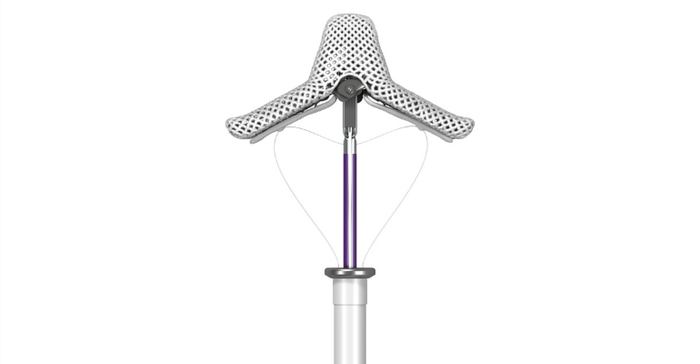Abbott Heart Valve Data Shines at EuroPCR
The data support the use of the company's TriClip tricuspid heart valve repair device, and Navitor, Abbott's transcatheter aortic valve implantation system.
May 19, 2022

Two data presentations at EuroPCR in Paris, France this week highlight Abbott heart valve technologies.
New real-world outcomes presented from the TriClip bRIGHT study showed that the TriClip and TriClip G4 transcatheter edge-to-edge repair (TEER) systems significantly reduce tricuspid regurgitaion (TR) and substantially improve quality of life across a wide range of anatomically diverse patients. The 30-day results show: a 98% implant success rate; significant TR reduction (71% moderator or less compared to 3% at baseline) with 99% freedom from major adverse events; Clinical improvements such as 78% of patients achieving New York Heart Association functional class I/II, an improvement by 57% from baseline of 21%, and an 18-point improvement in the Kansas City Cardiomyopathy Questionnaire score (a self-assessment of social abilities, symptoms, and quality of life).
"Historically, people suffering from severe tricuspid regurgitation had extremely limited treatment options despite being very ill. Many were ineligible for surgery and were limited to symptom management," said Philipp Lurz, MD, PhD, professor and deputy head of cardiology at the Heart Center Leipzig at University of Leipzig in Leipzig, Germany. "The late-breaking data show a high rate of implant success and significant reduction in regurgitation. Transcatheter edge-to-edge repair using TriClip has a huge potential to improve patients' quality of life and has entered the clinical stage with widespread use in Europe."
One-year data from a mutlicenter, international, single-arm study on Abbott's Navitor transcatheter aortic valve implantation (TAVI) system was also presented. Key findings include: 97.5% procedural success rate; high rte of no/trace paravalvular leak (PVL) (70.2%) and low rate of mild PVL (28.8%) through one year; low rate of all-cause mortality (4.2%) at one year; and single-digit gradients (average 7.5 mmHg) through one year.
"Patients with symptomatic, severe aortic stenosis are often at high risk of complications from open-heart surgery due to their old age, frailty or having multiple other diseases and conditions," said Dave Smith, MD, professor and consultant cardiologist at Morriston Hospital in Swansea, Wales. "The one-year results from the study demonstrate that a minimally invasive TAVI procedure with a Navitor valve offers a safe and effective treatment option for these patients."
Abbott noted that other data sets presented at EuroPCR included findings from the EXPAND study, which showed MitraClip therapy in heart failure patients with mitral regurgitation experience improved symptoms and quality of life. The MitraClip device is shown below.

Additionally, although women have higher rates of early complications with left atrial appendage (LAA) closure tan men, results from the Amulet investigative device exemption trial found that both women and men implanted with Abbott's Amplatzer Amulet LAA Occluder experienced similar long-term benefits from LAA closure.
The TriClip Transcatheter Tricuspid Valve Repair System and Navitor Transcatheter Aortic Valve are approved for investigational use only in the U.S
About the Author(s)
You May Also Like



.png?width=300&auto=webp&quality=80&disable=upscale)
